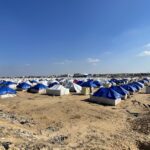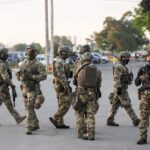“We Didn’t Start the Fire” is a column in collaboration with Foreign Policy for America’s NextGen network, a premier group of next generation foreign policy leaders committed to principled American engagement in the world. This column elevates the voices of diverse young leaders as they establish themselves as authorities in their areas of expertise and expose readers to new ideas and priorities. Here you can read about emergent perspectives, policies, risks, and opportunities that will shape the future of US foreign policy.
With Vice President Kamala Harris’s formal nomination as the Democratic candidate for president now behind us, it is important to consider what her foreign policy would look like as she seeks the highest office in the country and what her experiences mean for the world. Over the course of her tenure as Vice President, Harris has received some tough, no-win portfolios like the US-Mexico border and the often-overlooked and difficult-to-manage region of Southeast Asia.
Yet, while much of Southeast Asia gets lost in Washington’s focus on competition with China, some of the countries that were part of Harris’s portfolio, namely the Philippines, have assumed roles as some of the most critical foreign policy issues for the United States. As a result, if Harris wins in November, she will have strong connections throughout Southeast Asia — something as uncommon in US presidents as it is important at this moment in US history.
The Philippines has become a poster child for pushing back against Beijing’s aggression, and Washington has supported its treaty ally to improve its defense capabilities.
Improving Ties
During the Biden administration, Manila and Washington agreed to expand the original 2014 Enhanced Defense Cooperation Agreement (EDCA) in 2023 so that the United States would help develop a total of nine military sites throughout the Philippines. In July 2024, during the Philippines-United States Fourth 2+2 Ministerial Dialogue, the Biden administration announced that it would allocate $500 million in foreign military financing from the Indo-Pacific Security Supplemental Appropriations Act to the Philippines to enhance “the capability of the Armed Forces of the Philippines (AFP) and the Philippine Coast Guard to fulfill their territorial defense mission and contribute to regional security.”
The Philippines new leader, President Ferdinand “Bongbong” Marcos, Jr., has prioritized the country’s alliance with the US. Meanwhile, Washington has shown its desire to support its ally against its main strategic competitor: China.
Vice President Harris’s engagement with the Philippines predates these policy achievements. And in fact, it was her husband, Second Gentleman Douglas Emhoff, who visited the country first. Emhoff led Biden’s seven-person delegation to the inauguration of Marcos in June 2022. Emhoff delivered a personal note from Biden to Marcos and announced that the US would be sending additional supplies to fight the COVID-19 pandemic.
The Issue of Taiwan
Harris herself traveled to the Philippines in November 2022 (with Doug) for a meeting with Marcos and other engagements, including a stop in Palawan. She and Marcos reiterated the enduring US-Philippines alliance and the importance of cooperation — and also discussed the Taiwan issue.
Taiwan has been on the minds of policymakers in Manila since the People’s Liberation Army (PLA) conducted military exercises in August 2022 in response to then-US House Speaker Nancy Pelosi’s visit to Taipei. Part of the PLA drills overlapped with the Philippines’ exclusive economic zone, and the PLA regularly uses the waterways that separate the northern Philippines from southern Taiwan for access to the western Pacific. Harris’s discussion of the Taiwan issue with Marcos is important for both countries: while those talks give the US a sense of where Marcos stands on Taiwan, they also allow the Philippines to see what US expectations might be should the worst happen.
Mutual Defense
Importantly, Harris confirmed on this trip that the Biden administration believes that the mutual defense treaty applies to the South China Sea: “An armed attack on the Philippines Armed Forces, public vessels, or aircraft in the South China Sea would invoke US mutual defense commitments.”
This point was important for the Philippines, and hearing it from the mouth of the US vice president was necessary. The original text of the 1951 Mutual Defense Treaty, specifically articles four and five, are vague regarding geography. The treaty uses terms like “an armed attack in the Pacific Area” or even broader phrases like “in the Pacific,” and there has been debate about where the “Pacific” ends and whether or not that includes the South China Sea.
The Philippines itself separates the Pacific Ocean from the South China Sea. Harris’s confirmation that the South China Sea is part of the Pacific, per the treaty, allows Manila to rest easier; after all, that is its largest external flashpoint. And the Biden administration has been clear to Beijing that it would honor its obligations under the treaty given ongoing tensions around the Sabina Shoal and BRP Sierra Madre.
During her visit to Palawan, Harris visited Antonio Bautista Air Base in Puerto Princesa, a critical military installation on the island closest to the Spratly Islands, which is the center of the PRC’s aggression in the region. Aboard a Philippine Coast Guard vessel, Harris condemned the PRC’s actions against the Philippines. She also traveled to Tagburos village, a fishing community. Right-wing media outlets mocked that visit, but in the Philippines, many viewed it as a particularly important engagement.
Boosting Regional Ties
Biden did not host Marcos at the White House until May 2023, and later in April 2024 for the historic Philippines-Japan-United States trilateral summit. According to Politico, Harris has met with Marcos a total of six times — the most interactions that Harris has had with an Indo-Pacific leader — and “the two have developed ‘a close personal relationship.’” Indeed, credit for bringing the two countries closer goes to her contacts with the Philippines and Japan. Tokyo and Manila signed a reciprocal access agreement, which allows each country’s military to train in the other, in July 2024.
Beyond the Philippines, Harris has had ample time with other Southeast Asia leaders. Harris hosted a working lunch for the May 2022 US-ASEAN Summit at the White House. Harris’s experience in Southeast Asia continued into 2023. She led the US delegation to the 2023 ASEAN Summit in Jakarta, Indonesia, and hosted another US-ASEAN summit during this visit.
At the time, the decision to send Harris faced condemnation because Biden was skipping the summit despite being in the “neighborhood” with his trips to New Delhi and Hanoi. The decision for the president not to go in person was viewed as a snub for a region typically ignored by the United States outside of rhetoric. Biden’s choice to send Harris confirmed what some viewed as the typical bias against the Southeast Asia region over seemingly more important countries — in this instance, two countries that the United States is hoping to move closer into its camp in the US-China competition.
Building Trust
However, what was once considered a snub could be a benefit for the region. Harris has, through these high-level engagements, built trust with the leader of the Philippines and has hosted other ASEAN leaders. This once-ignored region is now one that a presidential candidate has as one of her greatest foreign policy strengths. The so-called “snub” by Biden created an opportunity for Harris, and after nearly four years, her interactions with Southeast Asia serve to burnish her foreign policy credentials as she fights for the Oval Office.
Should Harris triumph over Donald Trump (a candidate preferred by many in the Philippines before Biden dropped out of the race), Harris has the ability, and record, to make the case for Southeast Asian nations to put greater trust in the United States under her administration. If elected, her record in the region would benefit the US when she tries to convince those leaders to side with the United States over China in their strategic competition. And at least for the Philippines, a Harris presidency would further cement the US-Philippine alliance and create additional opportunities for the advancement of the relationship with Marcos, who has become the leader she knows best in the Indo-Pacific.














